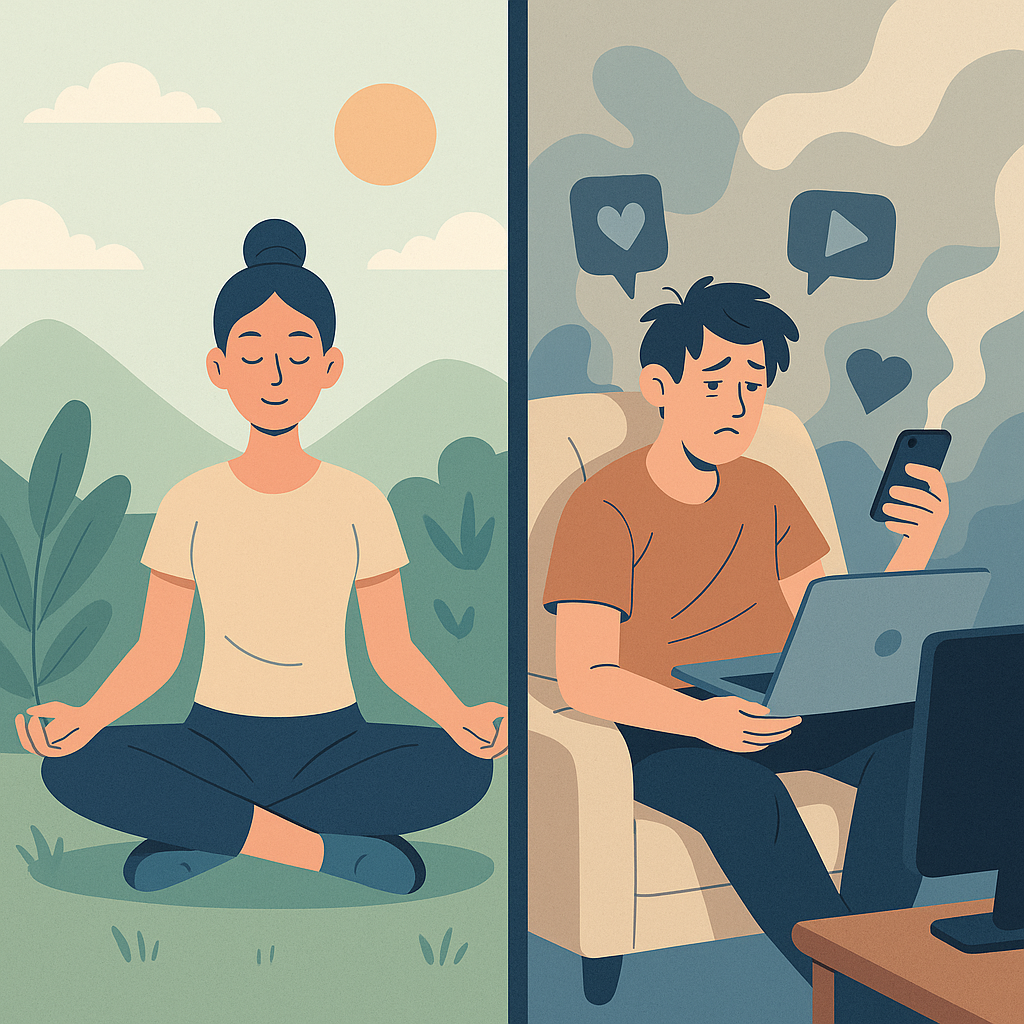Understanding the difference between rest and escape is more important than ever—especially as trends like digital detox and silent travel reshape how we recharge emotionally and mentally.

Why This Topic Matters Now
- In 2025, digital detox getaways are booming. Many people now pay extra so hotels can confiscate their phones on arrival.
- Offline retreats—from silent cabins to mindfulness resorts—are rising in popularity, echoing the craving for true mental restoration far beyond passive distraction cntraveler.com.
- Scientific reviews show benefits of unplugging: improved sleep, reduced stress, better relationships .
These trends highlight that mere escape—like doom-scrolling or binge-watching—doesn’t offer the same value as intentional rest.
What Is “Rest”? Versus Escape
| Aspect | Rest | Escape |
|---|---|---|
| Purpose | Intentional recovery and clarity | Temporary distraction from stress |
| Outcome | Renewal, better focus, problem-solving readiness | Temporary relief, but underlying issues persist |
| Examples | Silent retreat, digital detox, nature walk | Social media binge, binge-watching, substance use |
Rest is a deliberate process—like taking a mindful silence break—to nourish cognition and resilience. Escape, by contrast, offers fleeting relief without addressing root causes.
Digital Detox: The New Rest Technique
Digital detox retreats exemplify the difference between rest and escape in a tangible, trending format:
- Luxury resorts now offer phone-free packages—some guests literally pay their phones to be taken for the duration.
- Studies link these retreats to better sleep, lower stress, and deeper connections.
- However, early anxiety from “disconnecting” is common—but fades as people adjust and embrace restorative activities .
Thus, digital detox is restful regeneration, not mindless escape.
Psychology: Adaptive vs Maladaptive Escape
Psychological research draws a clear line:
- Adaptive escape (self-expansion): e.g., using a run or nature trip to re-center—promotes well-being.
- Maladaptive escape (self-suppression): e.g., binge-screen time that dulls awareness—linked to reduced mental health frontiersin.org.
Furthermore, excessive escape—travel, substance use, scrolling—can backfire when it’s the only coping tool.
Why This “Difference” Impacts Well-Being
- Cognitive Restoration: Short rests—like silent pauses—boost attention and learning.
- Mental Health: Repeated escape without rest fuels anxiety, disconnection, and burnout.
- Emotional Regulation: Rest invites reflection and healing. Escape often circumvents discomfort instead.
Practical Guide: Move from Escape → Intentional Rest
1. Identify Patterns
- Escape habits: binge-watching, doom-scrolling, social media marathons.
- Rest habits: time in silence, device-free walks, deep reading.
2. Start a Mini Digital Detox
- Unplug daily: e.g., “phone-free hour” after work.
- Unplug weekly: a no-screen day—cook, walk, reflect.
3. Travel Smarter
- Opt for retreats marked “tech-lite” or silent—these foster real rest, not just novelty.
4. Introduce “Rest Rituals”
- Mindful breathing, nature time, light reading—done with intention, these become rest practices vs distractions.
5. Monitor & Reflect
- Journal feelings pre- and post-rest: Do you feel calmer, clearer, emotionally stable?
Digital Wellness Tools That Help
While retreats are trendy, science supports daily small rituals too:
- Paper phone: Google’s minimalist planner as digital replacement.
- PauseNow apps: nudges helping you stay mindful during social media use arxiv.org.
These tools help you build rest habits, not escape loops.
Final Takeaway
The difference between rest and escape isn’t just semantic—it informs what recovery looks like:
- Rest transforms; escape postpones.
- Trends like digital detox and silent travel spotlight how true rest happens: through presence, intention, and withdrawal from noise.
- Daily rituals anchored in mindfulness outperform occasional escapes when it comes to restoring mental resilience and clarity.
Ready to Rest?
Rather than scrolling your feed tonight, try this: set a timer for 20 minutes of silence—no phone, no screen. Feel the difference? That’s rest—real recharge.
References
Zasowski, N. (2019). 3 Reasons Why Rest is Different Than Escape. Retrieved from Nicole Zasowski website: https://www.nicolezasowski.com/articles/2019/8/9/3-reasons-why-rest-is-different-than-escape pmc.ncbi.nlm.nih.govdanalewis.com+2nicolezasowski.com+2mentalhealth.org.uk+2
Lewis, D. (May 28, 2024). Escape vs. Rest: Navigating the Need for True Relaxation. Dana Lewis Blog. Retrieved from https://danalewis.com/2024/05/28/escape-vs-rest-navigating-the-need-for-true-relaxation/ danalewis.com
“Rest vs escapism: what’s the difference?” (2022). Beloved Blog. Retrieved from https://www.wearebeloved.ie/blog/rest-vs-escapism






